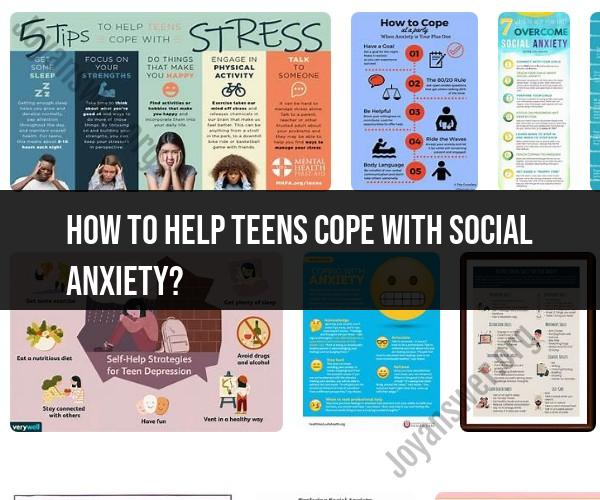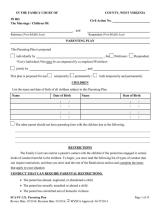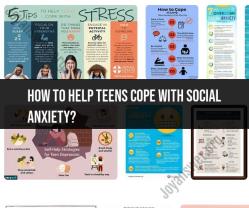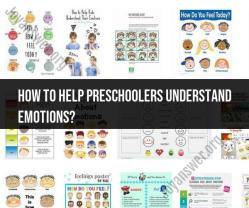How to help teens cope with social anxiety?
Helping teens cope with social anxiety can be a challenging but important task for parents. Social anxiety can significantly impact a teenager's daily life and well-being. Here are some guidance and strategies for parents to assist their teens in coping with social anxiety:
Open and Non-Judgmental Communication:
- Encourage your teen to talk openly about their feelings and experiences with social anxiety. Listen attentively and without judgment. Let them know that you're there to support them.
Educate Yourself:
- Learn about social anxiety disorder and its symptoms to better understand your teen's struggles. This knowledge will help you provide informed support.
Seek Professional Help:
- If your teen's social anxiety is severe or persistent, consider seeking help from a mental health professional, such as a therapist or counselor. They can provide evidence-based treatments like cognitive-behavioral therapy (CBT) or exposure therapy.
Encourage Gradual Exposure:
- Gradual exposure to social situations can help teens build confidence and reduce anxiety. Start with less intimidating situations and progressively work towards more challenging ones. Support and praise their efforts along the way.
Teach Coping Strategies:
- Teach your teen coping strategies for managing anxiety, such as deep breathing, mindfulness, and positive self-talk. Encourage them to practice these techniques regularly.
Set Realistic Expectations:
- Help your teen set realistic expectations for social interactions. Remind them that everyone makes mistakes and that social situations don't have to be perfect.
Role-Playing:
- Practice social situations at home through role-playing. This can help your teen become more comfortable with common social interactions.
Encourage Social Skills Development:
- Enroll your teen in social skills groups or activities where they can learn and practice social interaction in a supportive environment.
Promote Self-Esteem:
- Encourage activities that boost your teen's self-esteem and self-confidence. Recognize and celebrate their achievements, no matter how small they may seem.
Create a Safe Home Environment:
- Make your home a safe space where your teen feels accepted and valued. This can provide a sense of security and support as they navigate social challenges.
Be Patient:
- Understand that progress may be slow, and setbacks are normal. Be patient and supportive as your teen works on managing their social anxiety.
Encourage Independence:
- Gradually encourage your teen to take steps toward independence in managing their anxiety. This includes self-advocacy and seeking help when needed.
Limit Avoidance:
- While it's important to respect your teen's boundaries, avoid enabling avoidance behaviors. Encourage them to face their fears gradually rather than avoiding social situations altogether.
Foster Healthy Relationships:
- Help your teen build and maintain healthy friendships. Support them in finding social connections that are understanding and accepting.
Be a Role Model:
- Demonstrate healthy social behaviors and problem-solving skills in your own interactions. Your teen may learn valuable social skills by observing your actions.
Remember that supporting a teen with social anxiety may require time and patience. Be empathetic, stay engaged, and celebrate their successes along the way. Professional guidance from a therapist or counselor can be a valuable resource in helping your teen manage and overcome social anxiety.
Strategies for Parents: Helping Teens Cope with Social Anxiety
Social anxiety is a common mental health condition that affects people of all ages, but it can be especially difficult for teenagers. Teens are at a time in their lives when they are trying to figure out who they are and where they belong, and social anxiety can make these challenges even more difficult.
As a parent, there are a number of things you can do to help your teen cope with social anxiety:
- Be supportive and understanding. Let your teen know that you understand what they are going through and that you are there to support them. Avoid criticizing or judging your teen for their anxiety.
- Help your teen identify their triggers. What are the situations or people that make your teen's anxiety worse? Once you know what your teen's triggers are, you can start to develop strategies for coping with them.
- Encourage your teen to face their fears gradually. This may involve starting with small steps, such as talking to a cashier at the store or attending a small social gathering. As your teen becomes more comfortable in social situations, they can gradually increase the challenge.
- Help your teen develop coping mechanisms. There are a number of coping mechanisms that can be helpful for people with social anxiety, such as deep breathing, relaxation techniques, and positive self-talk. You can teach your teen these coping mechanisms and encourage them to use them when they are feeling anxious.
- Seek professional help if needed. If your teen's social anxiety is severe or if it is interfering with their daily life, it is important to seek professional help. A therapist can teach your teen coping skills and help them develop a treatment plan.
Building Resilience: Supporting Adolescents in Managing Social Anxiety
Resilience is the ability to bounce back from challenges and setbacks. It is an important skill for everyone to have, but it is especially important for teenagers with social anxiety.
Here are a few tips for helping your teen build resilience:
- Teach your teen about social anxiety. Help them understand what social anxiety is, what causes it, and how it can be managed.
- Help your teen develop a positive self-image. Encourage your teen to focus on their strengths and positive qualities.
- Help your teen develop a social support network. Encourage your teen to spend time with supportive friends and family members.
- Help your teen learn how to cope with stress and setbacks. Teach your teen coping skills such as deep breathing, relaxation techniques, and positive self-talk.
Practical Tips to Ease Social Anxiety in Teenagers
Here are a few practical tips to help ease social anxiety in teenagers:
- Encourage your teen to get involved in extracurricular activities. This is a great way for your teen to meet new people and make friends in a safe and supportive environment.
- Help your teen practice social skills. This could involve role-playing social situations or practicing starting conversations.
- Help your teen develop a comfort zone. Encourage your teen to identify social situations that they feel comfortable in. This could involve spending time with close friends or participating in activities that they enjoy.
- Be patient and supportive. It takes time to overcome social anxiety. Be patient with your teen and offer them your support along the way.
Remember, you are not alone. There are many resources available to help parents and teenagers cope with social anxiety. If you need help, please reach out to a mental health professional.












